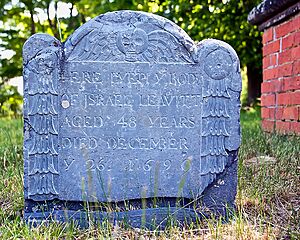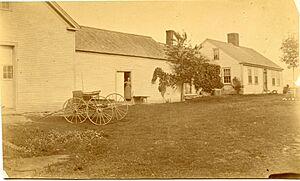Joseph Leavitt facts for kids
Joseph Leavitt (1757–1839) was an early American pioneer. He moved to what was then the frontier of Massachusetts (now Maine) after serving in the Continental Army. He served for three months at the start of the American Revolutionary War. However, he then decided he could not fight in battles.
Joseph Leavitt became known as a conscientious objector. This means he refused to fight because of his beliefs. He said he would move to Maine and help survey land for soldiers. Because of his peaceful beliefs, people called him 'Quaker Joe.' He was even given a special piece of land next to the new meetinghouse in Turner, Maine.
Contents
Joseph Leavitt: A Pioneer's Story
Early Life and War Service
Joseph Leavitt was born in 1757 in Pembroke, Massachusetts. His parents were Jacob and Sylvia Leavitt. His family had lived in Hingham, Massachusetts since the 1600s. Joseph grew up as the great-great-grandson of English settler John Leavitt. His father was a farmer in Pembroke.
When the American Revolutionary War began in 1775, Joseph Leavitt joined the Continental Army. He was a Private and served for three months. He helped fight against British forces during the Siege of Boston in 1775. This was one of the first battles of the war.
After his service, Leavitt decided he could not fight anymore. He famously said, "Some must stay at home and raise bread." He meant that while others fought, he would help feed them. This showed his strong belief in peace.
Starting Fresh in Maine
Soon after, Leavitt moved to a new area called Sylvester. This place is now part of Maine. He went with government surveyors who were mapping out new towns. These towns were along the Androscoggin River. Joseph helped the surveyors by noting the land's features. He told them he would return to settle there permanently. This area later became the town of Turner.
The surveyors knew Joseph was a pacifist. They joked, "Well, Joe, you will like to go to meeting." So, they gave him a piece of land right next to where the meetinghouse would be built.
The next year, Joseph Leavitt returned alone from Massachusetts. He carried his few supplies on his back. The closest non-Native person lived 20 miles away. Joseph got along well with the local Algonquian tribe. That spring and summer, he used an axe to clear land. He then built a blockhouse, which was the first house in the new town of Turner.
In the fall, Leavitt went back to Pembroke. Many settlers of Turner came from Pembroke. The next year, after the cold Maine winter, Joseph returned to his blockhouse. He planted a crop. Soon after, he walked to New Gloucester, Maine. There, he bought 19 apple tree seedlings. He carried them on his shoulders back to his home in the woods. He then planted his apple orchard.
Later that year, Joseph left his belongings with the Algonquins. He returned to Pembroke and married Anna Stevens. On their trip back to Maine, Anna rode behind him on his horse. Their belongings were in saddlebags on other horses. This journey took several weeks through what was then called the Province of Massachusetts.
Later Life and Legacy
Leavitt and his wife Anna continued to live in Turner. Joseph, the former soldier and pacifist, later opened a public house. He was also chosen to represent the town in local and state meetings. Anna (Stevens) Leavitt had eight children. Their oldest son was the first male child born in the new town of Turner. Joseph later married two more times. He had two more children with his second wife, Hannah Chandler. He had no children with his third wife, Elsea Caswell.
Joseph Leavitt's father, Jacob, eventually moved from Pembroke to live with his son in Maine. Jacob died in 1814 at age 82. His wife, Sylvia, died in 1810. Joseph Leavitt, known as 'Quaker Joe,' died in 1839 at age 83. He is buried in Turner's Upper Street Cemetery. His gravestone notes his brief service as a private in the American Revolution. His father Jacob is buried nearby. Jacob's gravestone also notes his service as a Minuteman in the Continental Army.
 | Percy Lavon Julian |
 | Katherine Johnson |
 | George Washington Carver |
 | Annie Easley |



